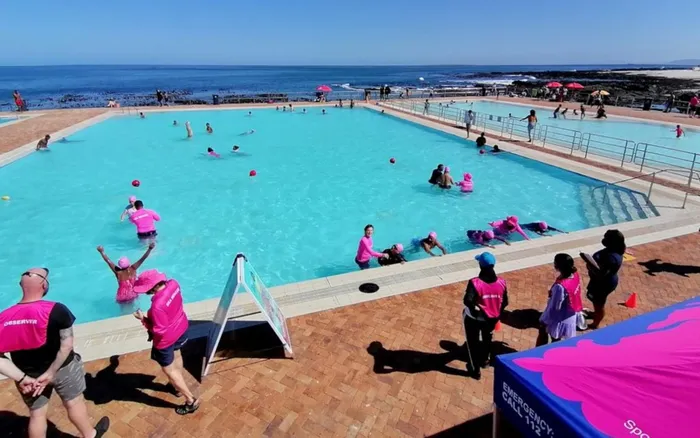Free NSRI survival swimming lessons at Muizenberg pool

The NSRI is holding free survival swimming lessons for the public. Pictured is a lesson held last year at the municipal swimming pool in Sea Point.
As the summer season approaches, the National Sea Rescue Institute (NSRI) will be holding survival swimming lessons in Muizenberg.
The free lessons are being held at the Muizenberg municipal swimming pool for ages 6 and up until December 15 and again from January 15 to March 4.
The survival swimming lessons are also being held at the Long Street Baths and the Hanover Park, Athlone, Delft, Strandfontein, Blue Downs and Retreat municipal swimming pools.
According to the NSRI’s Jill Fortuin, only 15% of South Africans can swim.
“The Western Cape is in the top-four provinces with the highest drowning figures. The average number of drownings per year is 1 477 across the country with 144 incidents per year for the Western Cape,” she said.
“January is the month with the highest drowning rates, and Sunday is the most common drowning day. Drownings mostly occur between 4pm and 8pm.”
The volunteer swimming instructors will be teaching adults and children the four basic skills of survival swimming: breath control, orientation, floating and moving through water.
“With the warmer season approaching, our time spent in and around water increases, making it crucial to learn the basic skills of how to stay afloat should you find yourself in difficulty in the water. These lessons are important lifesaving skills that everyone should learn.”
Ms Fortuin said rip currents were one of the biggest dangers faced by bathers.
“Rip currents are hard to spot for the untrained eye, and we, therefore, say that the best decision one can make when choosing which beach to go to is to make sure that lifeguards are on duty. If there are no lifeguards on duty, it is safest not to swim.”
Alcohol, lack of supervision of children and vulnerable persons, and swimming at unsupervised beaches also play a role in drownings.
Swimming pool owners should also take precautions to protect their visitors, said Ms Fortuin.
“It’s very important to ensure that swimming pools have a barrier fence with a gate that is a self-locking gate. When supervising children, avoid being distracted, for example, answering your mobile phone, or taking substances that may impair your focus, such as alcohol,” she said.
In October, the City began the deployment of 600 swimming pool and beach lifeguards, who will keep a watchful eye on bathers over the coming summer season.
According to the City’s drowning prevention plan, lifeguards will be on duty at 32 swimming pools and 29 beaches, tidal pools and stretches of the coast this season.
Mayoral committee member for community services and health Patricia van der Ross said lifeguards were working even when there were no active incidents for them to respond to.
“Part of their duties is to conduct observations and spot potential hazards before they become life-threatening. Lifeguards play an important role in ensuring the safety of bathers, and they’re often the first responders in an emergency at the beach,” she said.
In an effort to make swimming lessons accessible to those from underprivileged areas, the NSRI launched its first survival swimming centre this year at Meiring Primary School in Riebeek-Kasteel. This initiative won the International Maritime Rescue Federation (IMRF) Award for innovation in October.
For more information on the NSRI, visit www.nsri.org.za